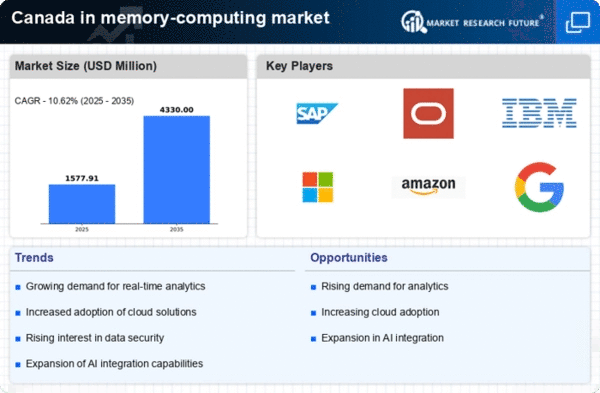Emergence of Smart Technologies and IoT
The proliferation of smart technologies and the Internet of Things (IoT) is driving transformative changes in the in memory-computing market. As more devices become interconnected, the volume of data generated is escalating rapidly, necessitating advanced processing capabilities. In Canada, it is projected that the number of connected IoT devices will surpass 1 billion by 2025, creating a pressing need for in memory-computing solutions that can analyze and process this data in real-time. This trend indicates a growing recognition of the importance of immediate data insights for operational efficiency and innovation. As a result, the in memory-computing market is expected to expand significantly, as organizations invest in technologies that can support the demands of a data-rich environment.
Growth of E-Commerce and Digital Services
The expansion of e-commerce and digital services in Canada significantly influences the in memory-computing market. With online retail sales projected to reach $50 billion by the end of 2025, businesses are increasingly reliant on efficient data processing to manage customer interactions and inventory in real-time. This reliance necessitates the adoption of in memory-computing solutions that can handle vast amounts of transactional data swiftly. As a result, the in memory-computing market is likely to see a compound annual growth rate (CAGR) of around 12% over the next few years, driven by the need for enhanced performance and responsiveness in digital platforms. The ability to process data in memory allows companies to optimize their operations and improve customer experiences, further solidifying the market's growth trajectory.
Increased Investment in Cloud Infrastructure
The in memory-computing market in Canada is benefiting from a significant increase in investments in cloud infrastructure. As organizations migrate to cloud-based solutions, the demand for in memory-computing technologies that can operate efficiently in these environments is rising. In 2025, it is anticipated that cloud spending in Canada will exceed $10 billion, with a substantial portion allocated to enhancing data processing capabilities. This trend suggests that businesses are prioritizing agility and scalability, which are essential for maintaining competitive advantages. Consequently, the in memory-computing market is likely to flourish as companies seek solutions that integrate seamlessly with cloud architectures, enabling them to harness the full potential of their data assets.
Regulatory Compliance and Data Security Needs
The in memory-computing market in Canada is increasingly influenced by the need for regulatory compliance and enhanced data security. As data protection regulations become more stringent, organizations are compelled to adopt solutions that ensure compliance while maintaining operational efficiency. In 2025, it is estimated that over 60% of Canadian businesses will prioritize data security measures, driving the demand for in memory-computing technologies that offer robust security features. This trend suggests that companies are not only focused on performance but also on safeguarding sensitive information. Consequently, the in memory-computing market is likely to see growth as businesses seek solutions that balance speed and security, ensuring they meet regulatory requirements while optimizing their data processing capabilities.
Rising Demand for Data-Driven Decision Making
The in memory-computing market in Canada is experiencing a notable surge in demand driven by organizations seeking to leverage data for informed decision-making. As businesses increasingly recognize the value of real-time insights, the need for rapid data processing capabilities becomes paramount. In 2025, it is estimated that approximately 70% of Canadian enterprises will prioritize data analytics, leading to a projected market growth of 15% annually. This trend indicates a shift towards data-centric strategies, compelling companies to adopt in memory-computing solutions that facilitate immediate access to critical information. Consequently, the in memory-computing market is poised to expand as organizations invest in technologies that enhance their analytical capabilities, thereby fostering a culture of data-driven decision-making.
















